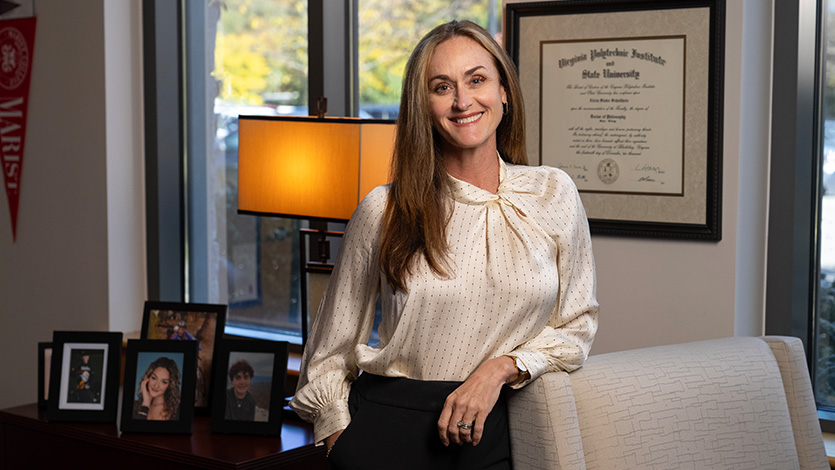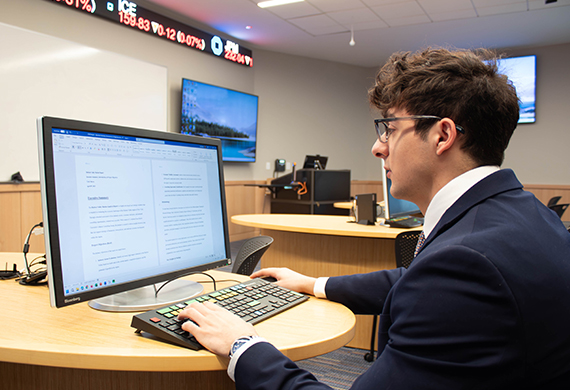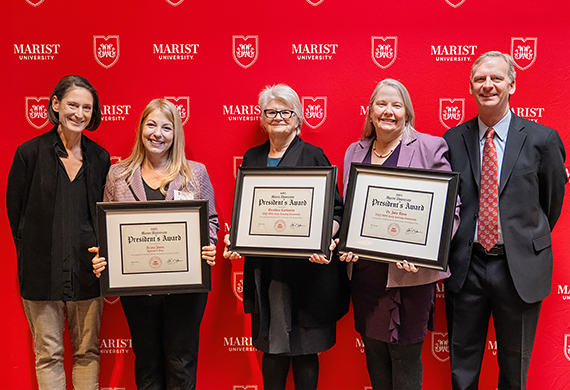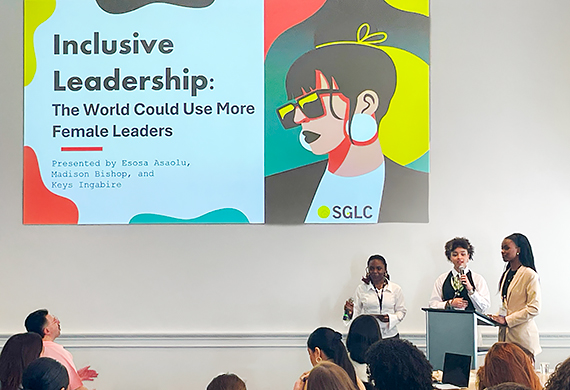Office Hours With Dr. Alicia Slater, Dean of the School of Science

Office Hours is a recurring segment where the Inside Marist team sparks conversations with key members of the campus community. Find out more about the inner workings of the College, gain fresh perspectives, and celebrate the invaluable contributions of those who make Marist the vibrant community that it is.
In this segment, Inside Marist's Michelle Eggink interviews Dr. Alicia Slater, Dean of the School of Science and Senior Associate Provost for Academic Operations. Dr. Slater holds a Bachelor of Science from Georgia Tech and a Master of Science and PhD from Virginia Tech. Her expertise includes STEM education, learner-centered teaching methods, and research on freshwater invertebrate genetics. She has been widely published in peer-reviewed journals and has secured multiple National Science Foundation grants to support her research and student success initiatives. Slater was recently appointed to the Board of Directors for the American Conference of Academic Deans (ACAD).
Q What initially sparked your interest in science?
A My father, a biology teacher and football coach, inspired my love for science. As a child, I was fascinated by his classroom, which was filled with plants and animals. He also had a passion for the outdoors, and together we dove for lobsters in the Florida Keys, surfed, fished, camped, skied, and mountain biked all over the southeastern U.S. These early outdoor experiences nurtured my love for the natural world and sparked my curiosity about science.
Because I excelled in math and science, my guidance counselor encouraged me to start college as an engineering student at Georgia Tech. However, I soon realized engineering didn't capture my interest in the same way biology did. Biology felt like a more natural fit, so I went on to study biology for my bachelor’s, master’s, and doctoral degrees. My love for the field continued to grow during my National Science Foundation postdoctoral fellowship at Griffith University in Australia, where I studied population genetics of tropical stream insects.
Q How have you adjusted to the weather in the Hudson Valley being from the south?
A Having spent most of my life in the southern U.S., I’m used to warmer weather, but the move to the Hudson Valley wasn’t too shocking because I attended graduate school in the New River Valley of Virginia, where the climate is very similar to the Hudson Valley. The biggest change was that moving from Florida required me to buy winter clothing for the first time in many years. But, because my husband, son, and I are avid snowboarders, we love the winters here and eagerly await snow season each year.
Dean Slater with her snowboard in an Allied Health science lab. Photo by Carlo de Jesus/Marist College.
Q What do you do for fun outside of academia?
A When I was younger, I used to compete in triathlons. These days I enjoy a relaxing ride on my bicycle or hike on one of the many excellent trails in the Hudson Valley. I’m also a big fan of working out in the gym, including weightlifting and cardio, and I exercise nearly every day. For some less active relaxation time, I enjoy reading historical non-fiction, especially focusing on the southeastern U.S.
Q At Marist, you’ve established the School of Science Faculty Learning Community and the School of Science’s inaugural Advisory Board. Can you tell me about these achievements and their impact?
A The School of Science Faculty Learning Community was established to nourish faculty through professional development opportunities and to provide support for faculty in their roles as teacher-scholars/clinicians. The idea grew from my own positive experiences with professional development opportunities, and I wanted to create a supportive space where faculty could explore new ideas, refine their teaching, and stay connected to their passions. Today, the community is led by my assistant dean, Dr. Kevin Henry. Typical sessions might feature book discussions or workshops on teaching practices and equity. There is also an active faculty mentoring network that is part of the FLC. It’s an incredible ongoing resource for the School of Science faculty and therefore our students.
The Advisory Board is another incredibly important newer initiative for our school. Consisting of 10 members, it provides me and the School of Science with strategic advice and support. Members include Marist alumni and supporters of the sciences and health fields. They offer guidance, contribute to student and faculty development, and support student success through philanthropic gifts, like funding student and faculty research and conference travel expenses.
Dean Slater holding Stetson Outstanding Advocate for First-Year Students Award next to books on teaching and equity. Photo by Carlo de Jesus/Marist College.
Q You’ve been deeply involved in initiatives aimed at improving equity and student success, including your work as co-Principal Investigator on Marist’s $1.48 million National Science Foundation grant to support academically talented students in STEM majors. How are initiatives like the National Science Foundation grant and the Gateways to Completion project improving student outcomes in STEM?
A The National Science Foundation grant and the Gateways to Completion project are pivotal initiatives that aim at increasing equity and improving student outcomes in STEM. The NSF grant focuses on supporting academically talented students, while the Gateways to Completion project aims to transform high DFW (drop, fail, withdraw) introductory science courses from being "gatekeeping" to "gateway" courses where more students have successful outcomes. We’re beginning to implement changes this fall to ensure these foundational courses provide all students with the opportunity to succeed in STEM fields regardless of their backgrounds.
Q What strategies do you employ or encourage to engage students in more challenging science courses?
A Over the years, I’ve realized that traditional science courses can often fall short in supporting student success. Faculty can enhance learning by adjusting lecture time, refining assignments, and incorporating more interactive, hands-on activities inside and outside of the classroom. By empowering faculty to adapt their teaching methods, we can help students engage with challenging material more effectively, leading to improved performance. These changes can also have a positive impact on retention rates, especially for students in their first year of science courses.
Q What inspired your focus on student success, particularly for students from underrepresented backgrounds?
A My experience attending a small rural high school in Georgia, with limited resources and socio-economic challenges, is initially what inspired my commitment to student success. Facing my high school's limitations and being a female in predominantly male science courses, I have lived the difficulties of succeeding in the sciences. As a professor teaching an introductory science course, I became deeply aware of the obstacles many students face, as well as the critical need for support and encouragement in the early phases of a STEM career.
At Marist, I believe that every student who makes it through our rigorous admissions process has the potential to succeed and it’s our responsibility to meet students where they are, support them, and provide the tools they need to thrive.
Q How would you describe your faculty as a whole?
A Our faculty is incredibly collaborative and very committed to student success. They not only focus on academics but care about the whole student, offering support both in academics and in life. This dedication is evident across all programs, from undergraduate to graduate, like our Doctor of Physical Therapy (DPT) and Physician Assistant (PA)programs, which both have 100% licensing exam pass rates.
The faculty is also service-oriented, stepping up during the pandemic to run campus health initiatives entirely on a volunteer basis. It speaks to their character and expertise—they’re not only highly knowledgeable but genuinely invested in our community.
Q How would you describe your leadership style?
A My leadership style centers on treating people with the same respect and care I’d like to receive, whether they are students, staff, or faculty. I try to focus on providing the support faculty need to become better educators, scholars, and clinicians, which ultimately leads to better learning outcomes for students. I always remember that I’m working with individuals, not just parts of a system.
Q If you could have dinner with anyone living or not, who would it be?
A I would go back in time and have dinner with a group of early would-be automakers. I’d tell them about the future negative impact of automobile emissions on the planet and encourage them to develop modes of transportation that focus on sustainability and a cleaner future for the industry and the environment.
Q What’s something most people don’t know about you?
A In the last decade, I’ve developed a passion for reading history and historical fiction, especially about the southern U.S. Growing up in the south, I wasn’t taught much about the true history of the southern U.S., the ongoing legacy of chattel slavery, the Civil Rights Movement, or forced school integration even though I was immersed in its effects. Now, I’m deeply engaged in these topics as I believe it is impossible to know oneself without understanding your roots. Some of my favorite reads in this genre include The Devil in the Grove, Frederick Douglass’ autobiography, The Warmth of Other Suns, and Blood Done Sign My Name. I’m currently reading Killers of the Dream, which explores the relationship between sexism and racism and James by Percival Everett.
Q The School of Science does a great job helping the local community through research and outreach. Are there any projects that extend to the larger community?
A People might be surprised to learn that the School of Science is heavily involved in international initiatives, in alignment with the institution’s broader focus on global engagement. We offer international opportunities for both undergraduate and graduate students. For example, we provide attachment courses for our undergraduate students and international locations for graduate students in clinical programs to complete their rotations. We’ve sent students to Ghana, the Virgin Islands for the PA program, and places like Italy and Sweden for the DPT program. We've also had students rotate on Native American reservations here in the U.S., incorporating a cultural component into their experience.
Q What advice do you have for School of Science students?
A Take the time to learn who you are. If you don’t know who you are, it’s hard to be authentic and live with meaning and purpose.



